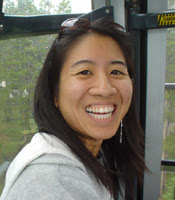This past weekend I attended the SCBWI-Carolinas annual regional conference. I learned about plot, pacing, and novel outlines and connected with old and new friends. Workshops and general sessions with editors and agents packed the schedule.
 |
| Liz Waniewski, Senior Editor at Dial Books for Young Readers |
On Saturday we gathered for an hour titled, "First Pages." Conference attendees were invited to submit the first 200 words of their work-in-progress.Thirty annonymous submissions were randomly chosen and read by a panel that included two editors and one agent. After each page was read the experts gave their on-the-spot-opinions on whether or not they would continue to read and their reasons why. This process mimics what they do everyday. Receiving piles of submissions, they are trained to quickly assess if a manuscript conveys conflict, grabs the reader, has voice, and is well-written.
 |
| Chris Richman, agent with Upstart Crow Literary Agency |
Having participated in "First Pages" before, I have come to appreciate their collective wisdom and often reach the same conclusions these professionals do while I am listening to the submissions. Pictured here were the three experts on Saturday.
 |
| Alvina Ling, Senior Editor at Little, Brown Books |
Since there were close to 200 attendees, I thought that the chance of mine being read was pretty slim. Without my full attention, I suddenly heard the opening line, "I am a scrubby old corn stalk stuck in the middle of Grandmother's rose garden." I sat up, grabbed the arm of my friend sitting next to me, whispered "that's mine!" and heard the speaker continue:
"If I hadn’t promised Daddy that I’d try and stick it out, I’d be on the first bus back to South Carolina. Wish I could hide under the linen tablecloth hanging to the floor like I used to. But I’m not a kid anymore.
"Ginny scolded me before dinner. 'Katie, you should wash your hair and put on a clean blouse before going downstairs.' But like always, I didn’t mind her advice. Just because she’s three years older than me she thinks she knows everything. Miss Smarty Pants. Almost as bad as Grandmother herself.
"So here I sit in my grandparent’s house in fancy Myers Park, grubby as a cotton picker. It doesn’t matter I’ve been unpacking boxes and trunks all day. Ginny has been too, but somehow she looks fresh and pretty. I notice my broken, dirty fingernails and I shove my hands into my skirt pockets. At least I changed out of my dungarees.
"'Anna Katherine!' Grandmother’s voice is sharp. 'Would you please fold your hands so that Granddaddy can say grace?'"
* * * * * * * * * * *
Two hundred words that I spent hours on. What would the panel say? Would this be enough to grab their interest and make them want to read more? Would my manuscript make it through this first critical reading?
I wanted to hear their comments but was scared. The last time my first page was read -- from a previous version and prior to developing this plot line -- was dismissed as uninteresting. My heart pounded. Here are some of their comments that I scribbled as they talked:
"Strong characterization. Strong sense of main character. Good example of voice. Liked the first line. Liked the information conveyed."
Best yet, each member of the panel said they would continue reading.
I was ecstatic.
It took ten minutes for my heart to stop racing.
Now, back to work. I have a book waiting to be written. And three recognized literary professionals who said they'd read more.
How about you? Are you hooked?









